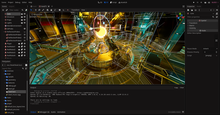
Back Godot (rekenaarspeletjie-enjin) Afrikaans Godot AN غودو Arabic Godot Bulgarian গডো (গেম ইঞ্জিন) Bengali/Bangla Godot Engine Catalan Godot Czech Godot German Godot Greek Godot (ludmotoro) Esperanto
 | |
 A screenshot of the editor in Godot 3.4 | |
| Original author(s) |
|
|---|---|
| Initial release | 14 January 2014[1] |
| Stable release | 4.3[2] |
| Repository | |
| Written in | C++[3] |
| Operating system | Microsoft Windows, macOS, Linux, Android, Web, FreeBSD, NetBSD, OpenBSD[4] |
| Platform | See § Supported platforms |
| Size | 28–189.3 Megabytes (varies by operating system)[5] |
| Available in | 36 languages |
List of languages Arabic, Argentine Spanish, Brazilian Portuguese, Bulgarian, Catalan, Czech, Dutch, English, Esperanto, Finnish, French, Galician, German, Greek, Hebrew, Hungarian, Indonesian, Italian, Japanese, Korean, Latvian, Malay, Norwegian Bokmål, Persian, Polish, Portuguese, Romanian, Russian, Slovak, Simplifield Chinese, Spanish, Swedish, Thai, Traditional Chinese, Turkish, Ukrainian, Vietnamese | |
| Type | Game engine |
| License | MIT License |
| Website | godotengine |
Godot (/ˈɡɒdoʊ/ GOD-oh)[a] is a cross-platform, free and open-source game engine released under the permissive MIT license. It was initially developed in Buenos Aires by Argentine software developers Juan Linietsky and Ariel Manzur[6] for several companies in Latin America prior to its public release in 2014.[7] The development environment runs on many platforms, and can export to several more. It is designed to create both 2D and 3D games targeting PC, mobile, web, and virtual, augmented, and mixed reality platforms and can also be used to develop non-game software, including editors.
- ^ Cite error: The named reference
FPRwas invoked but never defined (see the help page). - ^ "Godot 4.3, a shared effort".
- ^ Cite error: The named reference
OpenHubwas invoked but never defined (see the help page). - ^ Cite error: The named reference
Godot Featureswas invoked but never defined (see the help page). - ^ Cite error: The named reference
sizewas invoked but never defined (see the help page). - ^ Cite error: The named reference
Historia de Godotwas invoked but never defined (see the help page). - ^ Cite error: The named reference
80LVwas invoked but never defined (see the help page).
Cite error: There are <ref group=lower-alpha> tags or {{efn}} templates on this page, but the references will not show without a {{reflist|group=lower-alpha}} template or {{notelist}} template (see the help page).